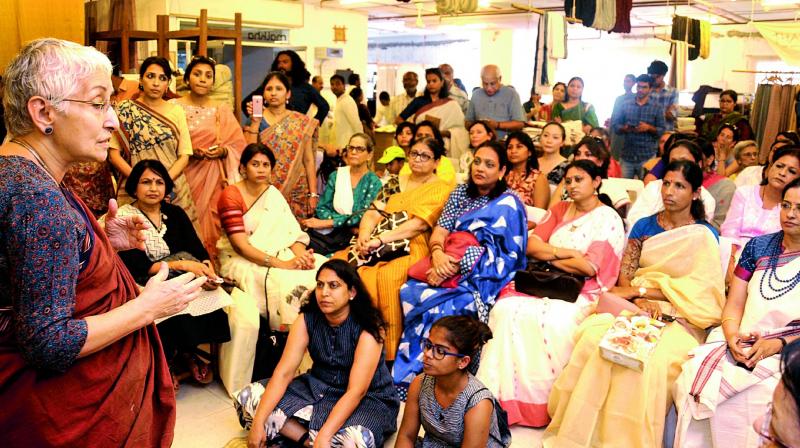Adding beauty to the handlooms
Malkha’s initiative adds beauty to the handlooms it creates by staying true to India’s traditional nature of village-based cloth making.

The room was brimming with women dressed in their best handlooms and weaves. They sat in attention and absorbed every word from Uzramma as she spoke about Malkha’s journey, indigenous cotton weaving, and organic dyeing, and explored Malkha fabrics.
Malkha Marketing Trust hosted the first of the several planned Coffee Mornings at its showroom in Mehdipatman on Saturday morning. The event was attended by a large number of handloom buffs. The event also expounded the various alternative ways to wash handlooms and to minimie the wastage of fabric during tailoring.
For almost 90 minutes, the founder, Uzra Bilgrami, also known as Uzramma, spoke about the growing demand of handlooms. “The youth are really into handloom. Further, hand-woven clothing is becoming increasingly popular in the fashion industry,” says the elegant silver-haired Hyderabad-based handloom expert.
The name Uzramma happens to be synonymous with Malkha, a blend of malmal and khadi.
“I work with 150 artisans — spinning machine operators, weavers, bobbin winders, and dyers — who earn a decent livelihood from working at Malkha, which I founded in 2005. Malkha’s breakthrough spinning technology enables the decentralisation of the production process by linking farmers directly with weavers. Basically, our production process is rewiring the lifecycle of the original, indigenous process,” explains the 76-year-old. “Although it destroys the vitality of the fibre and is an expensive and rather intensive process, we’re still baling and unbaling cotton because the spinning line of machines can only process bales.”
“Those used to machine-made cotton fabric and handlooms will inevitably find Malkha rough and heavy because Malkha uses only natural dyes such as cold-fermented indigo and pomegranate-peel yellow, while only red is derived from a non-toxic chemical. This puts a limitation on the colours in which the fabric is available,” says Uzramma.
Master dyer Salim Pasha, who has been with Malkha for the past 29 years, has been mentored by the renowned master dyer K. V. Chandramouli. “Although my education has been very limited and conventional, I find great joy in working in this space, using organic dyes, and playing my part in the handloom industry," he says.
Uzramma has also launched her latest summer collection. “We have introduced a collection of fresh summer pastels to highlight the breathable nature of the Malkha fabric. The fact that the lighter colours of the thandai collection are easy on our ageing weavers’ eyes is what makes the collection exceptionally close to our hearts,” she says.
The Malkha initiative adds beauty to the handlooms it creates, not only for their textures and colours but also the Malkha philosophy of staying true to India's traditional village-based nature of handloom cloth making. “Malkha is an incredible effort to bring back old systems and skills. I am glad that Uzramma is trying to set it right. We should totally support Malkha’s endeavours,” says Meena Appnender, Secretary, and Crafts Council of Telangana.

